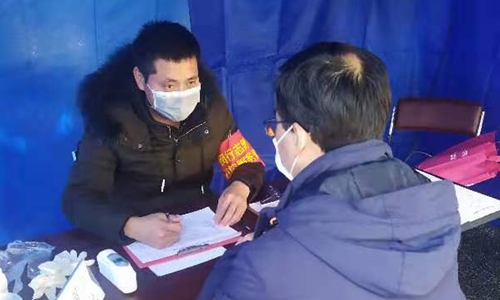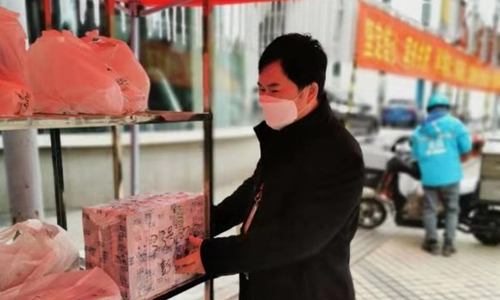HOME >> CHINA
Shanghai to maintain normal functioning as work officially resumes
By Huang Lanlan and Du Qiongfang Source:Global Times Published: 2020/2/12 23:30:33

Xie Jun asks a visitor of Jingduyuan residential community his travel history (courtesy of Xie)
As many people returned to work on Monday, Shanghai’s official work-resumption day this year, the city is trying hard to restore normal and orderly life while fighting against the novel coronavirus pneumonia (NCP).
The Global Times talked to people from various walks of life in Shanghai to find out about their current situation, as well as their efforts in contributing to the basically ordered society in this special time.
Express delivery: service resumes
Express delivery service has basically resumed in Shanghai though many staffers haven’t returned to work, some express company employees said.
Major enterprises including ZTO Express and STO Express have resumed operations in the city from Monday, according to the websites of these companies.
Hu, a delivery-person at a Yunda Express courier branch in Pudong New Area, said that fewer than 70 of the branch’s 170 delivery staffers have resumed work.
“That makes me very busy this week, delivering more than 100 packages each day,” Hu told the Global Times Wednesday. “There are still many packages at the branch waiting for distribution.”
At a ZTO branch in Huangpu district, nearly 20 delivery people were on duty Wednesday, one-fourth of its overall delivery staff.
“Some haven’t come back to Shanghai, and some are under the 14-day compulsory quarantine,” explained a staffer of the branch surnamed Ao.
The branch deals with some 1,500 packages per day at present. Most packages can be delivered on time, Ao told the Global Times, adding that they give priority to the items related to virus prevention and control.
“Citizens with packages of masks or disinfectant, please contact us,” she said. “We will deliver them to your homes as soon as possible.”

Huang Youchang checks the packages being delivered to Huizhihu residential community (courtesy of Huang)
Residential community: tightened measures
Some 300,000 staffers from more than 1,800 property management companies are serving Shanghai’s over 13,000 residential communities during the NCP outbreak, according to local construction authorities.
Huizhihu residential community in downtown Jiang’an district has 3,429 households with over 10,000 residents. The community has seen a slight rise in residents entering or leaving since work officially resumed on Monday, according to its property manager Huang Youchang.
“But the number (of people going out for work) is fewer than the same period last year,” Huang told the Global Times Wednesday, adding that only 250 to 300 residents enter or leave each day. “I estimate that many people have turned to telecommuting.”
At 9:00 am and 4:00 pm, Huang and his coworkers disinfect the building lobbies, passageways and elevators in the community to avoid possible virus transmission.
They also try to disinfect the shoes of the community residents by creatively laying a wet carpet soaked with disinfectant at the entrance of each building. “By stepping on the carpet, every person gets his or her shoes sterilized when entering the building,” Huang said.
Xie Jun, a property manager at Jingduyuan residential community in suburban Minhang district, has been working for 19 consecutive days since January 24, the Chinese New Year’s Eve. He is on duty from 7:00 am to 10:00 pm, and keeps his mobile phone on 24 hours a day for possible emergencies.
The community has banned outsiders from entering during the virus outbreak by issuing entry passes for all the residents of its 374 households, Xie said. “My colleagues and I sit at the gate all day, examining the entry pass and ID card of each person entering the community,” he told the Global Times Wednesday.
Including Xie, there are 13 property management company staffers serving the community. All the staffers are required to wear masks and gloves at work, he said.
Company employees: meeting demand
Seventy percent of manufacturers in Shanghai have started operation this week, Shanghai’s economy authority said.
Many local companies have prepared for the return of employees to work. Some employees told the Global Times that protective materials including hand sanitizers that their companies provide can basically meet the demand.
But medical masks are in short supply sometimes, they said.
Gu Wei, a local company staffer who returned to work at the beginning of this week, said he has just got two masks from his company so far, which are not enough since masks are disposable.
“Luckily I stay inside the office all day, so it will not be a big issue for me,” he told the Global Times Wednesday, adding that his company disinfects the workplace each day.
Instead of taking public transport, Gu and his colleagues commute to work by electric bicycle or private car to avoid the risk of being infected. Their company screens their temperatures each time they enter or leave the workplace, Gu said.
Besides, Gu’s company has a spacious canteen in which tables and seats are arranged far away from each other during the NCP outbreak. Gu said that although there are more than enough tables for them to have lunch together in the canteen, very few actually have meals there considering the infection risks.
“Those who eat in the canteen have no communication with each other and try to finish their meal within minutes,” he added.
Posted in: SOCIETY